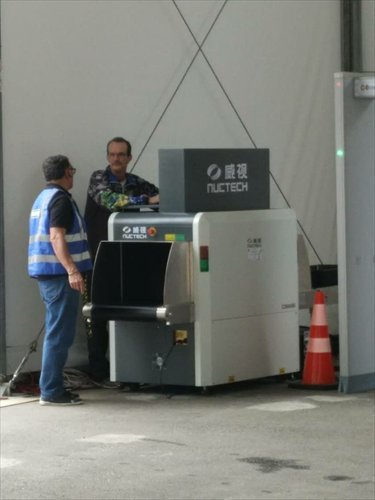China-made scanners, cameras help Brazil beef up security at Rio Olympics
Scanners, cameras help Brazil beef up security at Games

Security equipment made by China's Nuctech is seen at the Maracanã Stamduim, the main venue for the 2016 Oympics on Wednesday. Photo: Wang Cong/GT
Chinese-made security products, including security check scanners and surveillance cameras, have quietly been edging out Western versions and have been installed in Rio de Janeiro, as Brazil beefs up its security for the Olympic Games by increasing police patrols and investment in security equipment.
More than 260 security check machines manufactured by Beijing-based Nuctech Company Limited have been installed in the Maracanã Stadium and other major venues in Barra, Deodoro, Maracanã and Copacabana, the company said.
Chen Yongjian, general manager of Nuctech's Brazilian branch, told the Global Times on Wednesday that the company is the only Chinese firm that has provided security check machines to the Games. The other winning bidder is a Brazilian company.
Using a low radiation X-ray imaging system backed by advanced image algorithms, the Nuctech machines can help inspectors better identify explosives, weapons and flammable items, said Chen.
Moreover, an alarm will automatically go off if explosive items or items that cannot be penetrated are detected. Both the equipment and an on-site technical team will operate round-the-clock, said Chen.
Zhejiang-based Dahua Technology, China's leading provider of video surveillance products and services, reportedly provided 270 dome cameras to be installed at traffic intersections or crowded areas.
The cameras can capture facial information and compare it with images stored in a database, the People's Daily quoted Wu Yingjie, Brazil head of Dahua Technology, as saying.
Coming a long way
Apart from security check machines, China-made products are also ubiquitous in Rio. The subway trains, produced by a company in Changchun, Jilin Province, are expected to transport 300,000 people per day between the Olympic Park, Olympic Village and downtown Rio.
Stadium air conditioning, heavy machinery and instruments for weightlifting events and volleyball matches are also made by Chinese firms, according to media reports.
"Previously, only some low-level items made in China such as hats and whistles could be seen at major international competitions. [Nuctech's success] shows that the brand awareness and high-end technologies of Chinese manufacturers have gradually been recognized by the global market," Jiang Shixue, deputy director of the Institute of Latin American Studies at the Chinese Academy of Social Sciences, told the Global Times.
Besides their price, the quality of Chinese products and services is also increasingly appealing to other countries. Nuctech won the Rio bid in April and the Brazilian State Ministry of Justice signed the procurement contract with Nuctech in July for the X-ray systems.
Brazilian authorities praised the Chinese company's ability to deliver, install and train personnel, Chen said.
Security check equipment at large-scale international competitions used to be provided mainly by Western giants such as US companies Rapiscan Systems and AS&E, and German company Smiths Detection.
Rapiscan Systems was appointed the official security screening equipment provider for the Glasgow 2014 Commonwealth Games. The company also supplied 1,000 X-ray machines and the same number of archway and hand-held metal detectors to the 2010 London Olympic Games.
However, Nuctech has been catching up. The company now holds a nearly 30 percent share of the global market. It provided security check machines to the Sochi 2014 Winter Olympic Games and the 2014 football World Cup in Brazil.
Chen said the company's scanners will be responsible for 90 percent of security checks at the Rio Games, and some of the equipment will be also used at the Paralympic Games. So far, the debugging work for all the equipment has been accomplished and some of those installed at the Olympic Village have been activated.
After the Games, the systems will be used at prisons in Rio.
Impressions of Rio security
A Global Times reporter has learned that heightened security checks were palpable on Tuesday at airports in Sao Paulo and Rio de Janeiro.
Contrary to earlier images and news of police officers protesting at the Rio airport holding less-than-reassuring signs, a heavy police presence can be easily spotted at both major airports.
In Sao Paulo, outside the airport and in check-in halls, uniformed police officers patrol in small teams. And a similar police presence was also seen in Rio's airport Tuesday night.
At security check areas the police presence was obvious, but most people and luggage were checked by security equipment. Travelers were separated in two groups at security checks: one for accredited athletes and journalists, and another for regular travelers.
Amid growing security concerns, Brazil's sports minister Leonardo Picciani on Monday reassured visitors that Rio will be safe during the Olympics, pointing to a huge investment in security, both in hiring personnel and acquiring equipment.
Some 85,000 military personnel and police across the city are expected, or double the number on the streets of London in 2012.
Newspaper headline: Chinese products dot Rio